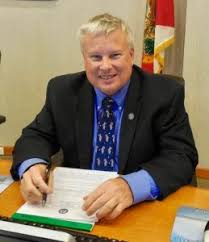Dale Martin
City Manager
Fernandina Beach
May 3, 2019 12:00 p.m.

After one of the infrequent “fifth Tuesday” breaks from City Commission meetings (which meets regularly on the first and third Tuesday), the City Commission returns to formal business this coming Tuesday. The agendas, including supporting documentation, for City Commission meetings are published the week before each meeting.
In order to adequately prepare each agenda, the deadline for agenda submissions is approximately three weeks before the scheduled meeting. Agendas and associated documents are now entirely electronically created.
Gone are the days (from as recently as a little over two years ago) of voluminous paper-based agenda packets. For innovations (such as the computer and word processing software) that were supposed to render paper obsolete, it’s now much too easy to create larger documents. City Commission agendas frequently have several hundred pages. As the agenda packets were created, those pages were shuttled between departments for review before returning to City Hall for compilation and copying and eventual distribution. I applaud the City staff effort for the transition to electronic agenda packets (but my “electronic” accolades will likely never extend to Microsoft Office 365!).
So what’s on these agendas? What does the City Commission do? The City Commission meetings are the formal business meetings of the City. Each meeting is a public meeting- which is distinct from a public hearing. The primary purpose of the meeting is to efficiently (the extent of which can be debated) conduct City business.
The key player in the conduct of an efficient meeting is the Mayor, whose most prominent mayoral duty is to oversee the City Commission meeting. As the “Chair” of the meeting, he introduces each agenda item and controls the discussion. Furthermore, as the Chair, he gets the last word, but not the first. In a few rare instances, I have seen Chairs fail to understand the role of the Chair, and use the position to dominate instead of facilitate. In my opinion, Mayor Johnny Miller does an exceptional job facilitating City Commission meetings.
The first part of a City Commission meeting typically offers proclamations and presentations to well-deserving individuals and organizations. Next Tuesday, the proclamations (all wonderfully crafted by City Clerk Caroline Best) recognize Neurofibromatosis Awareness Month, Mental Health First Aid Month, National Preservation Month, and Peace Officers Memorial Day/National Police Week.” Proclamations are read and presented by the Mayor.
The next portion of the agenda provides for public comment on items not part of later consideration; public comments on subsequent agenda items are welcome at the appropriate time. Anyone can speak- all that is required is that a form be completed for the official record, providing the name, address, and discussion topic. City residents get to speak first, followed by non-city residents (which, given our ragged borders and expansive postal code, can be enlightening to speakers when they are identified as non-city residents). Comments are supposed to be directed to the Mayor and all speakers have three minutes to speak, although the Mayor does have some discretion to offer more time, if necessary and desired.
Following public comments, the City Commission considers the Consent Agenda. The Consent Agenda is a procedural effort to be more efficient. Items included on the Consent Agenda are considered as a whole, being approved with one vote and no further discussion. City Commissioners may request that an item be removed from the Consent Agenda and be considered separately.
Since I am responsible for developing the agenda, the Consent Agenda is at my discretion. In general, I try to include relatively routine items on the Consent Agenda which I believe have strong (if not unanimous) City Commissioner support. Even with strong support, I recognize that a Commissioner may wish to comment on an item, so I do not include that item on the Consent Agenda.
Proposed Resolutions and Ordinances typically comprised the bulk of the City Commission meeting. Public comments are accepted and the City Commissioners conduct their deliberations on each issue. Before any comments or discussion begins, though, a motion must be offered by a Commissioner and supported by a second Commissioner. In some cases, a motion may not be “seconded,” so the original motion is not debated. The procedural aspect of the City Commission meeting is guided by strict (although again at the discretion of the Mayor) parliamentary rules- most communities are very relaxed (informal) in their procedures.
After resolutions and ordinances, appointments are made to boards and commissions (volunteers are always needed). Specific City Commissioner-introduced topics are then discussed. The meeting concludes with reports from key City staff and final comments from City Commissioners.
By the time each meeting is completed, staff is well into the development of the next meeting agenda. Agendas and associated packets can be found on the City’s website, and if interested, you can register to receive an electronic alert whenever an agenda for any board or commission is published.
